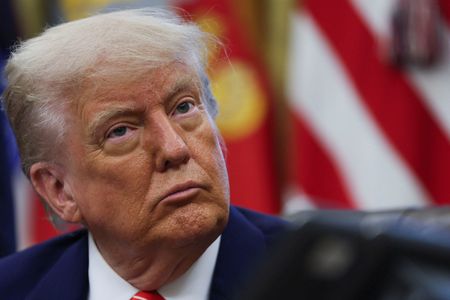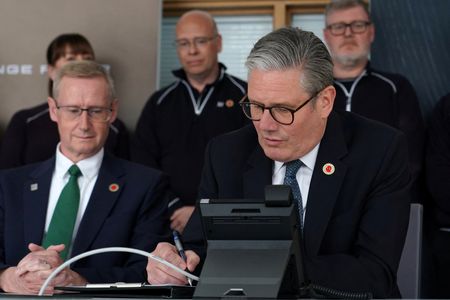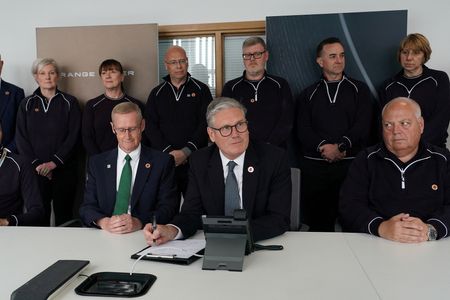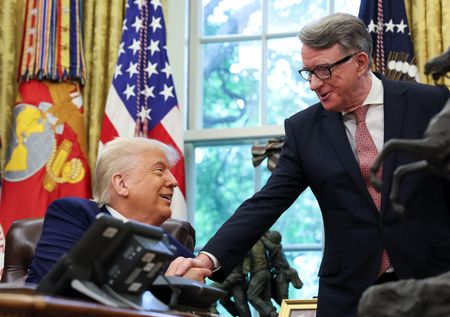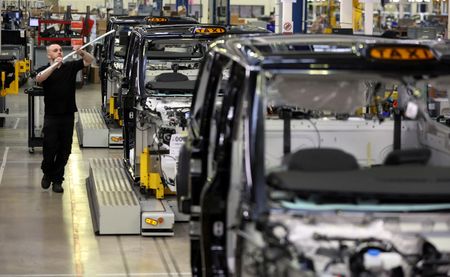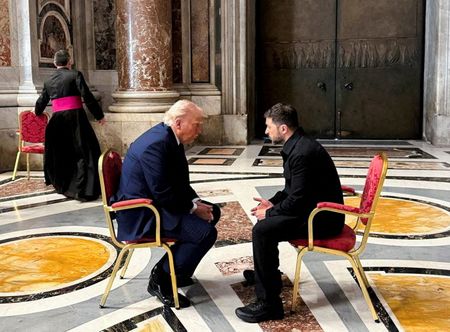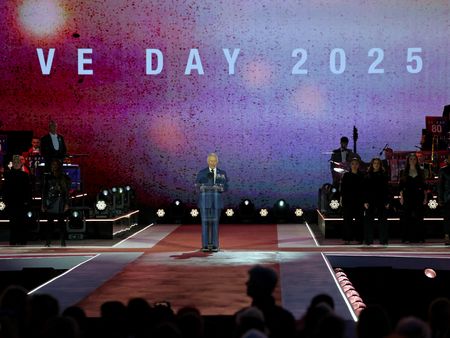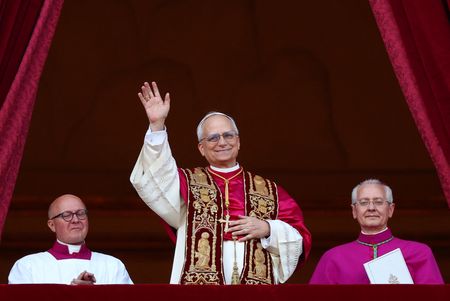By Alistair Smout, Andrew MacAskill and Andrea Shalal
LONDON/WASHINGTON (Reuters) -U.S. President Donald Trump and British Prime Minister Keir Starmer on Thursday announced a limited bilateral trade deal that leaves in place Trump’s 10% tariffs on British exports, modestly expands agricultural access for both countries and lowers prohibitive U.S. duties on British car exports.
The preliminary agreement is the first of dozens of tariff-lowering deals that Trump is trying to land in coming weeks after blitzing the global economy with steep new import taxes in a bid to reshape global trade in U.S. favor and shrink a $1.2 trillion U.S. goods trade deficit.
Trump downplayed the UK deal as a template for other negotiations, saying that Britain “made a good deal” and that many other trading partners may end up with much higher final tariffs because of their large U.S. trade surpluses.
In April, Trump imposed reciprocal duties of up to 50% on goods from 57 trading partners including the European Union, pausing them days later to allow time for negotiations. At the same time, he heaped new 25% tariffs on auto imports and ended all exemptions on steel and aluminum duties, announcing new tariff probes on pharmaceuticals, copper, lumber and semiconductors.
At a White House press conference with Starmer patched in on a speaker phone, the two leaders heralded the plan as a “breakthrough deal” that lowers average British tariffs on U.S. goods to 1.8% from 5.1%.
“It opens up a tremendous market for us,” Trump said.
“This is a really fantastic, historic day,” Starmer said by teleconference. “This is going to boost trade between and across our countries, it’s going to not only protect jobs, but create jobs, opening market access.”
Trump’s first trade deal fueled a rally on Wall Street, sending major U.S. indexes up over 1%. The S&P 500 passenger airlines index soared 6%, led by a 7% jump in Delta Air Lines (DAL.N) as U.S. Commerce Secretary Howard Lutnick said British-made Rolls-Royce engines would enter the U.S. duty-free.
In return, British airlines would place a new $10 billion order for Boeing aircraft, Lutnick said. Boeing shares were up nearly 4% before Thursday’s close, while Rolls-Royce shares rose 3.5% in London.
Trump’s administration has been under pressure from investors to strike deals to de-escalate its tariff war after Trump’s often chaotic policymaking upended global trade with friends and foe alike, threatening to stoke inflation and start a recession.
His biggest challenge, however, is resolving a virtual trade embargo between the U.S. and China, with tariffs of 145% and 125%, respectively on each side. U.S. and Chinese officials are due to hold talks in Switzerland on Saturday. Trump said these talks would be substantive — more than an ice-breaker — and that he knows that those tariff levels will be “coming down.”
WARM RELATIONSHIP, SOME DISAPPOINTMENT
The British-American Business group expressed disappointment that the deal leaves in place Trump’s 10% tariffs for many products, including cars, raising costs for UK exporters. It said it hoped that the deal would be a start of deeper U.S.-UK trade integration including on the digital economy.
Britain’s ambassador to the U.S., Peter Mandelson, concurred and said the deal was only a first step to reduce tariffs and trade barriers between the two allies, adding: “It’s not a still picture here. It’s a movie. It continues.”
The deal will provide potential new export opportunities for American producers worth $5 billion a year, Lutnick said, while the higher tariffs would generate $6 billion in annual U.S. revenue.
It will reduce U.S. tariffs on British auto imports to 10% from the current 27.5%, according to a UK statement. The lower rate will apply to a quota of 100,000 British vehicles, almost the total exported to the U.S. last year.
U.S. tariffs on imports from the struggling UK steel industry will fall to zero from 25%, while British tariffs on U.S. ethanol will fall to zero from 19%.
Both sides have agreed to new reciprocal market access on beef, with UK farmers given a tariff-free quota for 13,000 metric tonnes. There will be no weakening of UK food standards on imports.
Crucially there will be no weakening of UK food standards on U.S. beef imports, which was an election manifesto pledge for the Labour government. That means U.S. beef bred with growth hormones still won’t be allowed in. U.S. Agriculture Secretary Brooke Rollins said the deal would “exponentially increase” U.S. beef exports to Britain. But much depends on whether American beef could compete with the British beef on price and find favor with British consumers.
Currently 100% of the fresh beef sold by Britain’s two biggest supermarket chains Tesco and Sainsbury’s is British and Irish.
Details were scant on tariffs on UK pharmaceuticals imports, which could damage AstraZeneca and GSK, although a White House fact sheet said the deal would create a secure pharma supply chain.
The U.S. agreed to give Britain preferential treatment in any further tariffs imposed under Section 232 national security investigations, which include ongoing probes of pharmaceutical and semiconductor imports. GSK and AstraZeneca declined comment.
Starmer’s government has been seeking to build new trading relationships post-Brexit with the U.S., China and the EU without moving so far towards one bloc that it angers the others.
With the British economy struggling to grow, the tariffs had added to the pressure on his government.
Jaguar Land Rover paused its shipments to the U.S. for a month and the government was forced to seize control of British Steel to keep it operating.
Economists and one FTSE 100 chief executive said the immediate economic impact of a tariff deal was likely to be limited, but that trade agreements in general would help long-term growth. Britain struck a free trade agreement with India this week.
Britain’s digital service tax, levied at 2% of UK revenue for online marketplaces, would continue unchanged.
(Additional reporting by James Davey and Paul Sandle; writing by Kate Holton; Editing by Toby Chopra, Gareth Jones, Nick Zieminski and Daniel Wallis)

